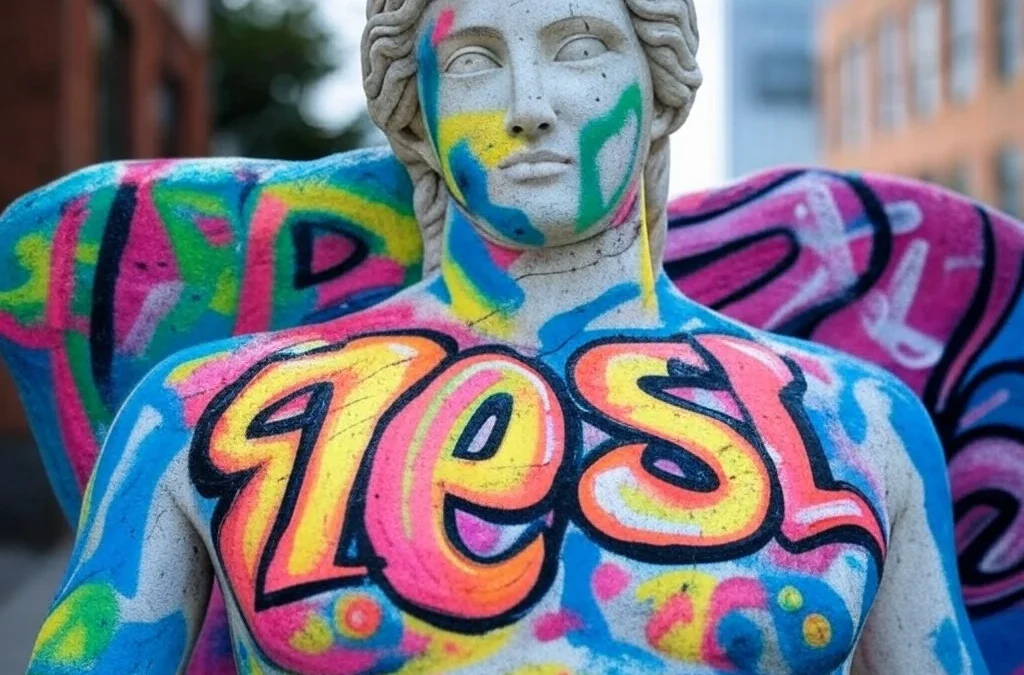We all know what it feels like when someone “crosses the line.” Maybe they say something they shouldn’t. Maybe they break a rule, ignore a warning, or do something that shocks everyone around them. That’s what transgression is about — going beyond what is considered normal, acceptable, or allowed.
Every society, workplace, culture, or family has limits. And people break them all the time — sometimes on purpose, sometimes by accident, and sometimes to challenge what those limits really mean.
In this article, you’ll find a definition of transgression, along with 30 of the best examples. These examples show what transgression looks like in real life — in schools, homes, public spaces, and everyday situations. You’ll also learn what transgressive behavior is, and how transgressive ideas can change the way people think.
What Is Transgression?
Transgression means breaking a rule, boundary, or limit — whether it’s legal, social, moral, or personal. It happens when someone crosses a line that is generally understood to be off-limits or forbidden. This line might be written into law, part of cultural traditions, or simply an unspoken rule people are expected to follow.
Transgressions can take many forms. They might be small, like speaking out of turn, or major, like committing a crime. Some are seen as offensive or shocking, while others challenge old rules in ways that lead to change. What counts as a transgression often depends on context — what is normal in one group may be completely unacceptable in another.
In simple terms, a transgression is the act of going beyond what is allowed or accepted. It’s about stepping outside the line — and what happens when you do.
Examples of Transgression
Here are 30 powerful examples of transgression that show what it looks like when someone crosses a line — socially, morally, legally, or personally. These real-life cases help explain the meaning of transgression in everyday situations. Each one highlights a different kind of boundary being broken.
1. A Student Cheating on a Final Exam
A student who hides answers or copies from a neighbor during an exam is crossing a clear academic boundary. This kind of behavior goes directly against the rules of the classroom. It’s not just dishonest — it’s a deliberate break from what’s expected. Transgression here is about ignoring shared standards for personal gain. Teachers, classmates, and the system itself are all affected by this act.
2. An Artist Painting Sacred Religious Symbols in a Sexual Context
Some artists challenge cultural or religious norms on purpose. When someone mixes religious symbols with themes like sex or violence, it often sparks controversy. This type of work breaks social taboos and is seen by some as deeply disrespectful. For others, it’s a statement about freedom of expression. Either way, it’s a transgression — a bold crossing of deeply held moral boundaries.
3. Sneaking Into a Private Party Without an Invitation
Imagine walking into a high-profile party without being invited. You’re not just breaking a rule — you’re stepping into a space where you clearly don’t belong. It might seem small, but it’s a real social transgression. It’s about violating the unspoken rules of belonging, permission, and respect. Most people would feel nervous or guilty doing this, and that feeling shows how strong the boundary is.
4. Burning a National Flag in Protest
Burning a country’s flag is legal in many places, but it’s still seen as a serious transgression. It’s not about violence — it’s about symbolism. The act challenges national pride, identity, and unity. It often creates strong emotional reactions. That’s because the flag represents more than fabric — it stands for shared beliefs. Destroying it breaks a powerful cultural norm.
5. Breaking a Family’s Silence About a Taboo Topic
In some families, certain things are never talked about — like addiction, abuse, or mental illness. When someone speaks openly about it, even years later, it can feel like a betrayal. But it’s also an act of honesty. The person is crossing a boundary that was built to keep secrets in place. This kind of transgression can lead to healing — or more conflict — depending on how it’s received.
6. A Comedian Making Jokes About Tragedy
Comedians often cross lines. When they joke about death, war, or disaster, some people laugh — others feel shocked or offended. Humor, in this case, becomes a way to step into forbidden territory. The audience’s discomfort shows just how far the comic is going. These moments test what society is willing to accept. That’s the essence of transgression — pushing the line to see where it really is.
7. A Prisoner Escaping From Jail
Escaping prison is a clear-cut transgression. It’s not just illegal — it’s a total rejection of the justice system. The person is refusing to accept punishment and choosing to go against the law in a dramatic way. It’s a physical and symbolic act. The boundary here is both literal (prison walls) and social (the sentence handed down by society). Crossing both makes it a powerful example.
8. A Fashion Designer Using Nudity on the Runway
Sometimes, fashion shows break the expected norms of modesty or decency. A model walking down the runway partially nude, especially in a conservative culture, can spark major backlash. Designers do this to shock, provoke, or send a message. It’s not accidental — it’s meant to break rules. The reaction it causes is part of the point. That makes it a clear act of cultural transgression.
9. Crossing a Military Border Without Permission
When someone crosses into a restricted or military zone, they’re not just trespassing — they’re entering forbidden space. Borders are heavily symbolic. They represent power, protection, and control. Violating them, even for a brief moment, can have serious consequences. It’s a very physical example of what it means to transgress a limit that’s meant to be absolute.
10. A Child Yelling at a Parent in Public
Most people have internal rules about how children should behave — especially toward adults. When a child yells at a parent in a store or restaurant, it often causes others to look away or feel uncomfortable. That’s because the child is breaking the unwritten rules of respect and order. It may seem small, but it shows how even daily life is full of boundaries we’re expected to follow.
11. A Worker Refusing to Follow a Dress Code
Imagine an office where everyone wears suits. One employee starts showing up in ripped jeans and T-shirts. They’re not just being casual — they’re pushing against a rule that shapes how people are supposed to present themselves. Dress codes are about control and conformity. Breaking them can be a small act, but it still disturbs the system. That’s a subtle but real transgression.
12. A Teacher Sharing Personal Political Views in Class
In many schools, teachers are expected to stay neutral. But some bring personal politics into the classroom. When that happens, the teacher crosses a boundary between education and influence. Students may feel pressured. Parents may complain. This is a transgression because it steps outside the expected role of a teacher. It challenges the trust that schools are built on.
13. A Guest Looking Through Drawers in Someone’s Home
You’re invited to dinner. You excuse yourself to the bathroom — and then peek into a bedroom drawer. That’s a clear social violation. You’re in a private space, and there are unspoken rules about respect. Breaking those rules, even quietly, is a form of transgression. It’s about curiosity stepping over the line of trust. Most people wouldn’t admit to doing it — and that says everything.
14. A Performer Using Profanity in a Children’s Show
Swearing in a show meant for kids isn’t just inappropriate — it completely disrupts the space. Parents are shocked. Children are confused. The performer has broken an unspoken agreement with the audience. That moment creates discomfort because it’s not supposed to happen. Transgression often works like this: it flips the expected tone, and forces people to react.
15. A Restaurant Owner Refusing to Serve a Local Celebrity
In many towns, celebrities or public figures get special treatment. So when a restaurant owner treats them like any other guest — or even refuses them service — it causes a stir. This isn’t just about service. It breaks a social script: fame usually grants privilege. Saying “no” to that disrupts the usual power balance. That’s why it counts as a form of social transgression.
16. Reading Someone’s Private Diary Without Permission
A diary is often the most personal thing a person owns. Reading it without asking is a deep invasion. It doesn’t matter if you’re a sibling, a partner, or a friend — it’s a clear line that’s not meant to be crossed. This act breaks trust in a very direct way. It’s not just nosiness. It’s an emotional and ethical transgression, because it takes what was never meant to be shared.
17. A Celebrity Posting Unfiltered Photos of Their Surgery
Celebrities are expected to maintain a certain image. When one of them posts raw, graphic photos of a medical procedure, it shocks their followers. It breaks the rules of beauty, privacy, and presentation — all at once. This kind of public honesty can be empowering, but it also disturbs the usual filter people expect. That disruption is what makes it a transgressive act.
18. A Priest Publicly Questioning Their Religion’s Beliefs
If a priest stands up and says they no longer believe in parts of their faith, it shakes the foundation of their role. They’re not just having doubts — they’re voicing them in a place of authority. That’s a major religious transgression. It challenges a structure built on certainty. For many followers, hearing that kind of statement is both painful and unsettling.
19. A Kid Telling Their Parent “You’re Lying” in Front of Others
In most cultures, children are expected to respect their parents. When a child calls out a parent — especially in front of other people — it flips that relationship. It may be honest, but it cuts against the norm. This moment becomes transgressive not just because of the words, but because of who is saying them, and when. It disturbs a social rule that’s deeply ingrained.
20. A Hacker Leaking Confidential Government Files
When someone breaks into a secure system and exposes government secrets, it’s more than just illegal. It’s a radical act of defiance. The hacker is not just crossing a digital barrier — they’re challenging national authority. Whether seen as a criminal or a whistleblower, their action disturbs the order of power and secrecy. This is a high-level transgression with huge consequences.
21. A Chef Serving Insects at a Formal Dinner
Picture a high-end restaurant. Guests expect steak or seafood. But instead, the chef brings out roasted crickets. The diners freeze. It’s not unsafe, but it’s shocking. The chef has broken expectations about what is “proper” food. In this case, transgression lies in offering something unfamiliar and culturally uncomfortable, especially in a setting where tradition usually rules.
22. A Student Interrupting a University Lecture to Disagree with the Professor
Most students stay quiet, take notes, and speak only when called on. But one student suddenly stands up, challenges the professor’s point, and refuses to back down. Even if the criticism is smart, the way it’s done crosses a boundary. This act disrupts the usual structure of authority in the classroom. It makes people uncomfortable because it breaks the rule of academic order.
23. A Bride Wearing a Black Dress at a Traditional Wedding
In many cultures, a wedding dress is expected to be white — it signals purity, joy, and tradition. A bride walking down the aisle in black challenges all that. It’s not illegal or harmful, but it breaks a strong cultural norm. The reaction of the guests will say everything. That’s what makes this a perfect example of social transgression. It flips a symbol that people deeply connect to.
24. A Teenager Blasting Loud Music in a Quiet Church
A church is usually a place of silence and respect. When someone starts playing loud music — especially if it’s aggressive or profane — the whole space changes. It becomes tense. People feel shocked, even angry. The music violates the atmosphere. That’s what makes it a transgression: not just what is done, but where and how it’s done, against the tone of the space.
25. A Journalist Publishing the Identity of a Protected Witness
In most legal systems, the identity of certain people — especially witnesses — is kept secret for safety reasons. When a journalist reveals that name, it crosses both ethical and legal lines. It can lead to serious consequences. This is a sharp example of transgression in professional ethics. It shows how freedom of speech can collide with rules of protection and trust.
26. A Tourist Climbing on a Sacred Monument
Some travelers ignore signs and climb on statues or temples that are meant to be respected. Even if no damage is done, the act is offensive to local customs. It shows disregard for the meaning the site holds. This kind of transgression is about ignoring cultural and spiritual boundaries — and it often leads to outrage from those who value the place.
27. An Employee Publicly Criticizing Their Boss on Social Media
Companies usually expect loyalty or at least silence about internal problems. When an employee posts harsh comments about their boss online, they cross a line. They bring private tension into a public space. That makes it a social and professional transgression. It breaks the invisible rule that says “keep it in the office.” It also risks serious consequences — including losing a job.
28. A Doctor Refusing to Follow Medical Protocol in an Emergency
Protocols in medicine exist to protect patients. But sometimes, a doctor chooses to ignore them — not out of laziness, but because they believe the protocol will harm the patient. This is a moral transgression. It goes against rules, but it might be done for a reason the doctor believes is right. That tension — between what’s required and what feels right — is at the heart of many real-world transgressions.
29. A Musician Interrupting a National Anthem with a Protest Song
Imagine a sports game. The crowd stands for the anthem. But suddenly, the performer stops mid-song and switches to a political message. People don’t know whether to clap, sit down, or boo. This isn’t just a performance change — it’s a deliberate challenge to tradition. The moment is uncomfortable, emotional, and divisive. That’s why it’s such a strong transgression example.
30. A Stranger Sitting Down at a Family Picnic
You’re at the park with your family. Food is out, people are chatting, kids are laughing. A stranger walks up and sits down at your table, without a word. They don’t seem threatening — just calm, like they belong. But they don’t. That small act violates a deep social rule: boundaries between strangers and private gatherings. It’s subtle, but it leaves people unsettled. That’s transgression at its most human.
Why Do People Transgress?
People cross boundaries for many different reasons. Some do it to rebel. Others want attention, freedom, or change. Sometimes it’s emotional — anger, shame, or pain can push someone to act in a way they normally wouldn’t. Other times, it’s a calm, conscious decision to reject a rule they see as unfair or outdated.
Not all transgressions come from bad intentions. Some people break rules because they believe doing so will lead to something better. History is full of people who went against the norm and were punished for it — only to be praised later when the world caught up. That doesn’t mean every act of defiance is noble. But it shows that transgression often comes from a deep need to speak up, stand out, or push back.
In everyday life, people transgress small boundaries all the time. Skipping a line. Ignoring dress codes. Telling a harsh truth in a moment where silence is expected. These aren’t crimes, but they still make waves. They make others pause. They show how many of our actions are shaped by silent expectations.
At its core, transgression reveals what matters to us. What shocks us shows where our limits are. What offends us shows what we protect. So when someone crosses a line — whether it’s with words, actions, or ideas — our reaction often says as much about us as it does about them.
What Is Transgressive Behavior?
Transgressive behavior means doing something that goes against accepted rules, values, or norms. It doesn’t always have to be illegal or violent. Sometimes, it’s as simple as breaking a social expectation – like talking loudly during a moment of silence or telling the blunt truth when everyone else stays polite. Other times, it’s more serious, like stealing, lying, or rejecting moral or legal standards.
This kind of behavior often makes people uncomfortable. It challenges the way things are usually done. That’s because every society, group, or family has its own set of boundaries. Some are clear, like laws. Others are invisible, but just as powerful. When someone crosses those lines, it can shock, upset, or even inspire others.
Transgressive behavior can come from many places. Sometimes, it’s done to provoke. Sometimes, it comes from anger, pain, or frustration. And in other cases, it’s a way to reject control or tradition. For example, a teenager staying out all night without permission isn’t just breaking curfew. They’re pushing back against authority – testing the limits. That’s a personal transgression, and many people go through it at some point in life.
It’s important to remember that what counts as “transgressive” depends on where you are and who you’re with. Chewing gum might be fine at a picnic, but seen as rude in a formal meeting. Laughing during a funeral might horrify one group and be totally normal in another. That’s why context matters.
In short, transgressive behavior is about crossing lines – and how people react when those lines are crossed. Sometimes it leads to punishment. Sometimes to change. But it always reveals something about the values we live by.
Synonyms of Transgression
Here are some of the most common and important synonyms for the word transgression:
-
Violation
-
Offense
-
Breach
-
Infringement
-
Misconduct
-
Wrongdoing
-
Crime
-
Sin
-
Disobedience
-
Trespass
-
Infraction
-
Contravention
-
Fault
-
Breaking the rules
-
Deviation
The Meaning of Transgressive Ideas
Transgressive ideas are thoughts, beliefs, or suggestions that challenge what most people accept as normal, right, or acceptable. These are not just bold opinions — they cross the lines that society, culture, or tradition has set. Often, they make people uncomfortable. Sometimes they spark change. Other times, they stir anger or backlash.
These ideas push against limits — moral, political, religious, or social. They can question long-held beliefs or propose actions that were once unthinkable. For example, imagine someone saying that school should be optional after age 12. That’s a transgressive idea. It doesn’t break a law, but it breaks the norm. It forces people to ask hard questions. Do we just disagree with it, or are we threatened by it?
Transgressive ideas don’t always come from a place of rebellion. They might grow from real frustration. Or a desire for truth. Or a simple need to say what no one else is willing to say. Throughout history, many breakthroughs — in science, art, or politics — started with ideas that were seen as transgressive at the time.
But not all transgressive thinking is useful. Some ideas cross lines just to provoke, not to improve anything. The key is in the reaction. If the idea sparks real thought, challenges a false belief, or opens new discussion, it might be worth listening to — even if it feels wrong at first. But if it only seeks to offend or disrupt without reason, it may just be noise.
In short, transgressive ideas are powerful because they test boundaries. They can be creative, dangerous, freeing, or reckless. They remind us that many of the rules we live by are not fixed — and that questioning them can be both risky and necessary.
Read also
The Most Popular on BitGlint

30 Temptation Examples & Definition
Temptation is a part of everyday life. Everyone faces moments where they feel pulled towards something they know might...

30 Examples of Gathering & What It Means
The word gathering shows up in everyday life more than we think. People gather at dinner tables, sports games, places...

30 Emotional Pleasure Examples & Meaning
Emotional pleasure comes from experiences that satisfy the heart, not just the senses. It’s the feeling you get when...

Top 50 Biggest Examples of Controversy
Controversy has been part of human society for as long as people have disagreed. Healthy debate can help a society...

30 Seduction Examples & Meaning
Seduction is part of how people build attraction, create emotional tension, and connect on a deeper level. From a...

100+ Things That Are Cold
Cold is something most people understand the moment they feel it. You step outside on a freezing morning. You grab a...

Top 30 Desire Examples & Definition
Desire is a powerful force that drives much of human behavior, shaping our goals, dreams, and everyday decisions. It's...
Get Inspired with BitGlint
The Latest
30 Liminal Space Examples & Meaning
You’ve probably been in a liminal space without even knowing it. An empty hallway in a hotel. A school building during summer. A quiet airport at night. These places feel strange—but also oddly familiar. You’re not where you were. You’re not yet where you’re going....

40 Powerful Anecdote Examples
Stories shape how people understand ideas - but not all stories are the same. One of the most common and useful forms is the anecdote: a short, focused story that captures a single moment to make a point clearer or more memorable. You encounter anecdotes constantly -...
30 Nature Worship Examples & Meaning
Nature has always mattered to people. Long before modern religions, people looked to the sky, the land, and the seasons for meaning. They saw power in the sun, mystery in the moon, and spirit in rivers, trees, and animals. They didn’t need churches or scriptures to...
Top 50 Examples of Cyberbullying & Definition
In today's digital age, cyberbullying has become a serious issue that affects people of all ages. With the rise of social media platforms and instant messaging apps, harmful behavior can spread quickly and reach a wide audience. Unlike traditional bullying,...

